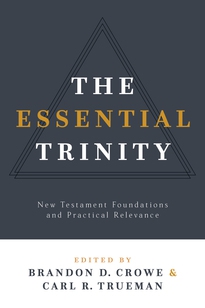The Essential Trinity: New Testament Foundations and Practical Relevance edited by Carl R. Trueman & Brandon D. Crowe

Currently 45% off at Wtsbook.com (only $10.99)
PART 1: NEW TESTAMENT FOUNDATIONS
- The Trinity and the Gospel of Matthew by Brandon D. Crowe
- The Trinity and the Gospel of Mark by Daniel Johansson
- The Trinity and Luke-Acts by Alan J. Thompson
- The Trinity and the Gospel of John by Richard Bauckham
- Paul and the Trinity by Brian S. Rosner
- Hebrews and the Trinity by Jonathan I. Griffiths
- The Trinity and the General Epistles by Brandon D. Crowe
- An apocalyptic trinitarian model: The book of Daniel’s influence on Revelation’s conception of the Trinity by Benjamin L. Gladd
- The Trinity and the Old Testament: real presence or imposition? by Mark S. Gignilliat
PART 2: PRACTICAL RELEVANCE
- The mystery of the Trinity by Scott R. Swain
- The Trinity and prayer by Carl R. Trueman
- The Trinity and revelation by Mark D. Thompson
- The Trinity and worship by Robert Letham
- The Trinity and preaching by Michael Reeves
INTRODUCTION
Brandon D. Crowe and Carl R. Trueman
The Trinity is foundational to Christian theology. Indeed, for more than fifty years Christian theological discussion has been increasingly dominated by discussion of the doctrine, in large part due to the provocative move by Karl Barth in making it the every principle of his dogmatic enterprise. Unfortunately, however, it is not uncommon to encounter the view that the Trinity is a nonbiblical doctrine (or perhaps one possible way of reading biblical texts) that arose only on the basis of later philosophical speculation. Likewise, many consider the Trinity to be a ‘take it or leave it doctrine’ when it comes to living the Christian life. The Bible – according to many – does not contain the doctrine of the Trinity, and even if it did, that would be something only for theologians to debate. However, historically in the Christian church the Trinity has been understood to be a robustly biblical doctrine with immense relevance for practical living. It is with this in mind that we present this volume, one that eschews overly technical discussion and focuses attention on the importance of the doctrine for every Christian.
The chapters in part 1 consider the trinitarian contours of every corpus of the New Testament, along with a chapter reflecting on the Old Testament roots of trinitarian doctrine. Here we must be clear: the term ‘Trinity’ and key terminology such as homoousios do not appear in Scripture; the technical terminology for trinitarian doctrine comes later, being crystallized in the fourth century. However, this precision of language does not import something foreign into the biblical texts, but faithfully articulates the content of those texts. In other words, it is the presupposition of this volume that trinitarian doctrine legitimately and necessarily follows from the phenomena of Scripture, rightly understood. Therefore, when using the term ‘Trinity’ or ‘trinitarian’ throughout this volume in relation to biblical books, we speak of the triadic contours of the text that lead – inexorably – to the doctrine of the Trinity. Stated differently, one of the aims of this volume is to show that faithful exegesis of biblical texts necessitates a trinitarian reading of the biblical texts, especially in the New Testament, where the doctrine is more fully revealed than in the Old Testament. The chapters in part 1 focus primarily on the New Testament witnesses, but also necessarily include reflections on the Old Testament backgrounds for the New Testament theological perspective. Indeed, chapter 8, on Revelation, and chapter 9, the final chapter in part 1, which is devoted to Old Testament revelation, will consider in greater detail how the New Testament’s trinitarian witness is rooted in the Old Testament.
In part 2 we will address, at least implicitly, the charge that the Trinity is irrelevant as a practical doctrine. We will begin with a concise definition of the Trinity, followed by several chapters considering topics relevant for Christian life. Some will be more geared to leaders in the church, but we believe that all readers will benefit from the wisdom contained in these chapters.
The contributors to this volume represent a spectrum of theological perspectives, yet all agree that the Trinity is based on Scripture (part 1), and that the Trinity matters for how we live (part 2). This agreement on trinitarian doctrine reflects the agreement of orthodox Christian theology through the centuries. Christian theology has always affirmed the Trinity as a nonnegotiable aspect of the one catholic and apostolic faith, even when differences persist over some other theological and ecclesiastical elements. Though one would not expect each contributor to agree with every other in all respects, the scope of the volume provides strong evidence from contributors with various backgrounds that the Trinity is a necessary doctrine – necessary both to interpret Scripture faithfully, and necessary for daytoday living.
The editors would like to acknowledge our gratefulness to Philip Duce and the entire team at InterVarsity Press for their support for this volume, along with the contributors for their labours and participation. We would also like to thank the board, faculty and administration of Westminster Theological Seminary for their support in various ways that have helped enable the completion of this project. Special thanks go to our families, especially our wives, Cheryl and Catriona. Finally, we give highest thanks and praise to our triune God, not least because of the grace of the gospel, which bears a trinitarian shape. Soli Deo gloria.

Comments